by: Katy Kroll, Looper
Cinematographer Ian Seabrook has carved out a unique niche for himself in Hollywood — he has cornered the market when it comes to underwater filming in big-budget movies and beyond. His credits include "The Twilight Saga: New Moon," "Mission: Impossible – Ghost Protocol," "Man of Steel," "Batman v Superman: Dawn of Justice," "Pirates of the Caribbean: Dead Men Tell No Tales," "Deadpool 2," "Army of the Dead" ... and the list goes on and on.
Seabrook's latest high-profile film is Disney's live-action take on the Jungle Cruise theme park ride. Starring Dwayne Johnson and Emily Blunt, "Jungle Cruise" takes viewers on a wild ride down the Amazon River in search of magical healing petals from a mythical tree in the early 20th century. Seabrook's big scene comes when Johnson and Blunt dive into the river to solve a giant underwater puzzle that will hopefully lead them to their final destination.
In an exclusive interview with Looper, Seabrook opened up about his unparalleled underwater career, giving an incomparable peek into behind-the-scenes details on some of Hollywood's biggest films. Read on to find out what it's really like working with Dwayne Johnson, Ryan Reynolds, and Zack Snyder — and get the inside scoop on Aquaman's first big-screen appearance and the real story behind a controversial deleted scene from "Deadpool 2."
Dwayne Johnson and Emily Blunt did most of their own underwater stunts in Jungle Cruise
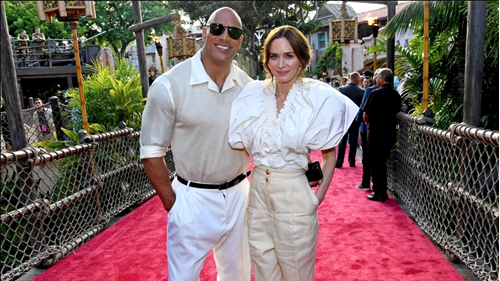
Kevin Mazur/Getty Images
First, let me start by asking, how does one get into underwater cinematography?
Not an easy question to answer or an easy venture to undertake. There's really no schooling for it. You have to be, first and foremost, a diver. I think a lot of people, especially who work in the camera department or on set, go, "That's so cool ... I could do that." And the thought process is that it's just a question of grabbing the camera and jumping into water. But the skill set required to do the job is out of the reach of a lot of people. They don't even consider what goes into it. Not only is it composition, lighting, and gripping, it's working with the talent and keeping them alive and keeping yourself alive and managing a small group of people in the water.
For me, I did a journeyman's process in the camera department. I started off as an unpaid intern, and then I was a loader, and then I was a focus puller, and then I was an operator. But even when I was a focus puller, I was already shooting under water. I had been an underwater stills photographer before I was a cinematographer. So I did have knowledge of exposure, film, processing, all that kind of stuff. I'm not saying that everyone who does it — I mean, there's not that many people who do it, but most of the people that I know who do it have some sort of photographic background, and diving background, and biology background of some sort. Maybe they were a scientific diver at some point, or they were attached to a documentary crew where there were scientists involved because they were the underwater cameraman that was able to capture what the scientists needed for whatever study they were doing.
So, I think for sure the misnomer is that it's just a matter of jumping under water with a camera, but that's simply not the case. I think there's a couple of courses that you may be able to take through a few guilds, but there's no schooling for it. I think first and foremost, you need to be a good diver.
Well, that journey has led you to some pretty high-profile projects, including your latest, "Jungle Cruise." You worked with Dwayne Johnson and Emily Blunt. Were they both actually under water or were stunt doubles/CGI used?
They did. They were under water. They were 100% under water. Dwayne has two stunt people that he normally works with and we rotated through both of those gentlemen, Tanoai Reed and Myles Humphus. And Emily Blunt had a stuntwoman with her, Lauren Shaw. So, I worked with everybody — three stunt people and two casts.
But Dwayne and Emily did the underwater work. And when it was not possible for them to do that work due to scheduling, a lot of times when we were shooting, we were shooting concurrently with the main unit, so they were in almost every shot or every scene of the film. Except when Jesse Plemons is on camera, of course.
A lot of it was done around scheduling. We would work with them when they were available. If they were not, or if it was required, we would put motion trackers on their face, in the event that if it ever got to the stage where they just never made it to the tank due to scheduling and we had to shoot something, then we were able to shoot and would try to do some face replacement. But I don't believe any of that was used in the film.
Dwayne Johnson and Emily Blunt had a 'spirited competition' on the set of Jungle Cruise
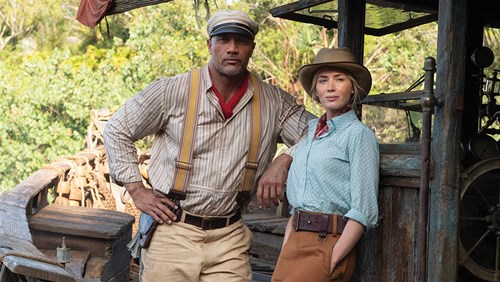
Frank Masi/Disney
I assume that Dwayne's done underwater stuff like this before because he's in a lot of action movies, but not so much Emily. Were they both ready to just jump on in?
Emily was great in the water. I don't want to speak out of context here, but I don't believe she'd done much underwater work prior. She was very good. She was able to hold her breath for the required time. Her sense of alarm was also quite amazing under water with her breath-hold work.
Dwayne had done some water work on "Baywatch," I believe, and I think that might have been it. I'm not sure, maybe something on "The Rundown," but I don't know that it was an actual under water scene. I can't really remember, but he was up for it. I mean, he's obviously very physically capable, and I think there was a spirited competition between the two of them on that film. And obviously it comes across on screen as well.
But, yeah, they were both very capable under water. And that's a major consideration because if your talent is not comfortable underwater, you're going to get maybe one take out of them and then the rest of it's going to have to be done with stunt personnel or a body double or something. It happens a lot, and the list of people who are able to act and do well holding their breath in an overhead enclosed environment is a pretty short list.
So, for that "Jungle Cruise" sequence, Emily was in an overhead environment in that the puzzle set had a roof on it, but it was removable. Still, in order to get out, if there was a difficulty during the shooting, whenever she was around, we made sure that there was an opening that she could get out of. First and foremost, consideration on any of this kind of work is the safety of the talent. They have to have escape routes. They have to be able to get out. It's not as simply as just showing up on a film set with a green screen and you can easily get out if there's a problem. This is completely different.
So, overhead, lack of visibility, not being able to see, holding your breath, which some people aren't super comfortable with. But they both did really well. But it is not a skill set that every actor has, for sure.
Piggybacking on that, did anything challenging or even scary happen on the set of "Jungle Cruise" when you were working on it?
I would say safety-wise, no. Everything was done within their limitations. And basically, I usually say, you're driving this. If you don't feel comfortable, you come up or you bail. Some people they really want to do it. They want to go longer and harder and hold their breath for longer, or push it, or whatever. But nothing really dramatic happened on "Jungle Cruise."
However, on another picture I recently did, "Old" by M. Night Shyamalan, we did have a situation where we had someone nearly drown, but I made sure that that didn't happen. So, it can happen on any job, but it didn't happen on "Jungle Cruise."
On the flip side of that, in terms of "Jungle Cruise," any funny or memorable moments from the set?
It was pretty straightforward. I guess I could say that when we did the shot of the two of them getting into water and Emily's character doesn't really want to get in, I was in the water with the cameras shooting that. I was in the water with the cast and then the other camera was on a technocrane. We were both dancing around each other trying not to get in each other's shots. And basically when Dwayne showed up, he recognized me from shooting before and said, "How you doing, brother?" And he gave me a side slap on the shoulder and I was holding the camera and it was like... [makes a dramatic swaying motion].
Also, when we started shooting, I'm backing up on my tiptoes because the water level had to be such that it was believable for them to be starting their swim. And I think he was probably on a slant so that Emily could fit over his shoulders, because she gets over his shoulders and then they dive down. And when he took his first breaststroke, he's got such massive wingspan that when he did that, he was right in front of me for the very first take we did it. So I was like, "Okay, I know that when he finishes this certain line, I'm going to have to really time when I'm rocking back in order to keep him in the frame." So, he didn't leave the frame, he just got big and the focus puller was like, "Ahhhh."
But that's it. I don't have any juicy tidbits. But, yeah, for me it was like, "How is it going, Dwayne?" And he goes, "Hey, how is it going?" And then he just practically knocked me into the side of the boat [with his friendly shoulder slap].
Yeah, he obviously looks like a huge guy...
Yeah, he's a big guy. He's a super nice guy, too. I've worked with him a couple of times. I did some work with him on "Skyscraper" and I did some work with him on one of the first films that he starred in, which was the remake of "Walking Tall." And I remember him going, "Is it okay if I'm here? Can I stand here? Is it okay?" And I went over to the cameraman on that film and said, "Wow, he's super polite and unobtrusive." And he says, "Yeah, that'll all change. Don't worry. It'll all change. Once they get popular, they all change." But Dwayne is still courteous and polite. I don't know how long ago that film was, but he's still the same guy. Of course, his career has obviously exploded since then.
Director Zack Snyder is more hands off on certain elements than you might expect
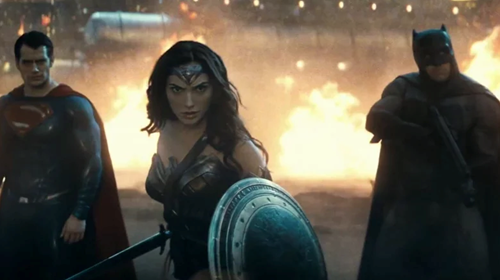
Warner Bros./DC Entertainment
Now, "Jungle Cruise" isn't the first film you've worked on based on a Disney theme park ride. You also shot scenes for "Pirates of the Caribbean: Dead Men Tell No Tales." How did those two filming experiences compare?
Well, the "Pirates of the Caribbean" sequence was mostly when Javier Bardem's ship comes across another pirate's ship and opens fire on them. So, we had some special effects mortar rounds going in the water and they were shooting pellets into the water while we had flame elements, we had a lot of great shots. I had a lot of projectiles coming at me underwater. I narrowly avoided being hit in the head with a cannon. At one point I recall one of the boats nearly caught fire. It was very different. I wasn't really working with principal cast. It was mostly stunt people because Johnny Depp wasn't there, a few other people weren't there. They are vastly different experiences, for sure.
In addition to "Jungle Cruise" and "Pirates," you have quite an impressive resume with a lot of high-profile films, including several Marvel and DC films. And you've worked on several projects with Zack Snyder ... what was it like to film alongside him?
Zack is one of the select few people that I would jump on a grenade for, figuratively speaking. He's a great collaborator. Whereas, say, M. Night Shyamalan is very specific about what he wants lens-wise, what he wants within the frame, and he won't settle until he gets it.
Zack is exacting, but he understands that there's also room for improvisation. So, when we did the sequence at the beginning of "Batman v Superman," when the kids find the kryptonite rock, we shot that in Tahiti. It was supposed to be the Indian Ocean, and basically, we shot like 15 different angles on that, and two of them made it in the film. But he didn't really tell me what to do. I basically guessed what he would want. We did a rehearsal and took some photographs before he arrived in Tahiti, and once he showed up, everybody went out and did the survey — there was the producer boat and then there was the camera boat, and we were out on the reef and he said, "Okay, let's see."
He was trying to describe what he wanted, and I thought, "Okay, this will go one way or the other. I'm going to show him what I've done and if he doesn't like that, then he's going to think, 'Well, why would you do it like that?'" But I showed him and he was like, "That's exactly the shot. So ... great. We're done. We can go." Out the door and then the next day we did all the shooting.
He's a great person. Once he trusts you, he gives you a lot of leeway. And when you have autonomy and you're working with a good director, it's a lot of trust. My best work will come out of me in that environment, and Zack is very supportive.
What has been your favorite project to work with him on?
Well, I'm going to probably say exactly the sequence that I just described, "Batman v Superman" in Tahiti. It was the place, it was the people, it was a very small crew — I don't like to use the word magical very much in my dialogue, but it really was just stunning. I mean, I've been to the South Pacific several times and it's my favorite place in the world to go, for sure. And that whole experience was just amazing.
"Army of the Dead" was a different experience. I shot the second unit on that with Zack's regular stunt coordinator, Damon Caro, who is the second unit director and is also fantastic and very precise and engaging. How he motivates his own stunt crew through excellence is just another form of a great, strong work ethic. So he and I worked quite well together, and we had a lot of challenges doing that job. And, again, Zack just left us alone. Sometimes you won't even hear a report card — "I didn't like this" or "I didn't like that." We didn't really get any of that from Zack. Sometimes no news is good news, and sometimes no news means you don't know what they think.
But nonetheless, we had a lot of challenges on that film, specifically the kitchen fight with Chambers, played by Samantha Win, who shoots her way out of the zombies. That was like, "How do I light this when there are no lights?" The whole thing was lit with flashlights and glowsticks. Then we basically spent a few days choreographing and going through the movements. We broke everything down in sections and then we shot it in Atlantic City. The whole sequence was shot in one day. Normally you would probably take at least a couple of days or a few weeks with rehearsals and stuff to do it, but Damon and I just connected pretty quickly.
Ryan Reynolds may have been the reason this one Deadpool 2 scene was deleted
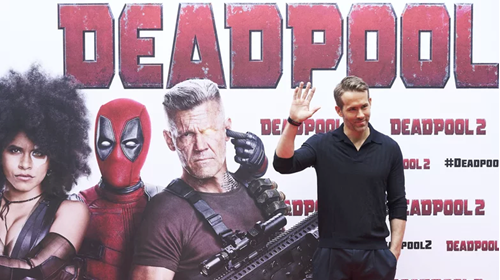
Carlos Alvarez/Getty Images
You also worked on "Deadpool 2." What was it like doing those scenes, and any memorable moments with Ryan Reynolds?
Plenty. He, to date, is probably the actor with the best breath hold — and I've worked with Tom Cruise. He's longer, although he's using other techniques, which we did not use on "Deadpool." Plus, Ryan had to do the whole sequence in a prosthetic. And sometimes there'll be water that goes inside the skullcap. We had that happen on "Freddy vs. Jason," where Robert Englund, who plays Freddy Krueger, had a prosthetic on and water started going into it. So, he turned into an egghead with a bald cap moving around, which looked quite ridiculous.
But anyway ... Bill Corso is the makeup artist who put all that stuff on Ryan's stunt double initially. Because you do all the testing on the stunt double guinea pig before you put it on the principal actor. So, there was a sequence in that film when Ryan's character is communicating with his wife — I believe it's his wife, not his girlfriend — played by Morena Baccarin. We shot an entire underwater sequence, which they cut out of the film and it's not in any of the deleted scenes on the Blu-ray or anything.
You don't really know the reasons why they deleted it. I think Ryan didn't like the way he looked. I think there was the writing. Maybe they didn't like the acting. There's a whole bunch of reasons. But, as far as Morena was concerned, she had massive water phobia. So, what she was able to accomplish in that film when we shot her and Ryan together under water, she was in an apartment, the whole apartment set, where he meets with her. That was completely submerged. And she was sitting down in a weighted chair, not easy to get out of it. You could get out, but it's not super easy. She did a lot of training, but her ability to overcome her fears and still perform, I thought was pretty extraordinary. And the fact that it didn't make it into the film, I know that she was pretty vocal about her disappointment on the internet.
Every film, sometimes you shoot sequences and they don't make it in the film. Oftentimes, I'll look at the script and say, "Okay, if there's a long runtime, what's the first thing that's going to go?" They usually cut all the aerial shots, or the crane shots, and whatever else. And sometimes they'll cut out the water stuff. I've fortunately not been in that position much, where my work's been cut out, but it's happened. They'll chop it up because it's too long or whatever.
In "Deadpool," there was a safety diver who was trying to tell Ryan how to do his breath hold. And Ryan did this big stunt, and then he swam out of the set. And when he was getting ready to get out, someone said, "Maybe you should try this." And he just said, "I know what I'm doing." And I was like, "Yeah, yeah, he does."
Normally when I'm working with cast that are holding their breath, I'll take my regulator out of my mouth in solidarity, if you will. It's usually just hung around my shoulder. I have to stay down longer than they do. Oftentimes their prep before they come down is taking a few good exhales and then going down. In "Deadpool," we had to do underwater sync sound dialogue. So, Ryan had to mouth his lines. I think we tried it with sound, but he ended up just wanting to loop all the dialogue later. But that whole scene is gone. I mean, I have all the photographs from it. I still remember it very vividly, but it's nowhere to be found. It's on the Marvel cutting room floor somewhere.
You never know if it'll turn up. They package and repackage things.
Indeed they do. But yeah, we did a lot of work on that film for what ended up in the picture. And Ryan was pretty spectacular underwater. I mean, everybody that I know who was on that would agree with what I'm saying.
Charlize Theron is another one I've worked with a couple of times and she's very, very capable underwater too. It's one thing to say, "Okay, I'm going to go down and hold my breath and look scared" — because it's a natural reaction for most people when they're not in a comfortable environment. But for her to know what side of the camera to look at, and where to look, and where to put a look, she knows the lenses. Harrison Ford was the same way. He knew exactly where to look. "What lens are you on? 50 mil? Okay." And he'll just know because he's been doing it for so long. But Charlize, she told me she didn't have a great experience on "Atomic Blonde" in the water, so on "Tully," we made sure that she had a good experience — and I hope that she did. I never heard her report card, but you always hope that they don't go, "Oh my God, that was horrible."
But like I said, the safety of the talent is paramount. It's the first thing we start talking about. Like when I was doing the reboot of "The Fog," they wanted to cut holes in the bottom of the car for Selma Blair to get out of. And I said, "Well, you don't swim down when you want to get out of something, you swim up. So intrinsically, you're going to kill her. She's going to swim down and get trapped underneath the car. And you'll be the one who did it."
That was with a big production meeting with a bunch of people. You have to figure this stuff out before you shoot it as opposed to you showing up on the day and wondering how you are going to get out. "Oh, well, we just thought she would swim under the car." That doesn't work at all. That's why it's necessary to have a lot of meetings and dialogue about that kind of thing with the effects department, with the producers, to make sure that we're all on the same page.
Aquaman's underwater scenes in Justice League are all computer generated
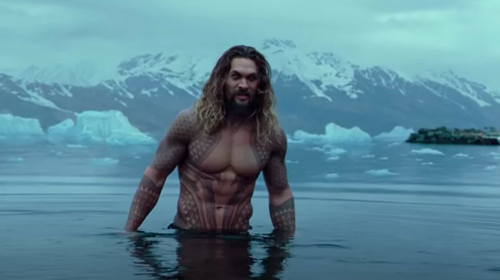
Warner Bros./DC Entertainment
Having worked for both DC and Marvel, what are your dream projects for both houses?
Well, when I was working in Detroit with Zack on "Batman v Superman," he said to me, "How are we going to do this?" And I didn't really know what he was talking about because I already knew what I was going to do with Amy Adams getting trapped underwater and then Superman rescues her. But what he was referring to was Aquaman and "Justice League." He said he wanted him to travel as fast as Superman — or Supes, as he called him. I proposed a bunch of different things that were practical. We could use camera speed or whatever.
But basically there was a shift in the stunt personnel for Wonder Woman and the underwater stunt rigor that I normally work with on Zack Snyder films and he wasn't available. So the stunt crew that was working on "Justice League" was not water-savvy. And that's why a lot of Aquaman ended up being dry for wet. It was not underwater, it was done with Jason Momoa on a wire rig. It was like a harness rig that he goes inside of and it's like a seesaw kind of thing that moves around. I've used it a few times on a couple of films where they wanted to simulate underwater work.
I mean, of course, it never looks convincing. But if there's a lot of elements involved and most of it's CG, then I guess it makes sense. Aquaman, of course, syncs dialogue underwater. Not impossible. I've done it on one called "Pathfinder" before — not a great film. But as far as Aquaman, I was looking forward to being fully underwater, but so far he's dry for wet. He's all CG and computer. I mean, most people can figure that out anyway.
Anyway, I would say for Marvel, that one of my favorite comics when I was younger was the Sub-Mariner. And so far they haven't made a film like that. I don't know who would play him, specifically because he's mostly wearing a green Speedo and he's got Vulcan ears. But I'm sure like Aquaman, they will do a wardrobe shift — which, when we did the camera test for "Batman vs. Superman," the first time Aquaman had ever been onscreen, I shot him. And the tests we did, we did them in a swimming pool in Detroit and the whole thing was blacked out so that nobody could see. And Jason, Jason's basically a screen test for Aquaman. I had all the lights set up and was supposed to manage the submarine that's looking for him in that film and I saw this shadow going in front of me and I looked over and the first thing I saw was the redesigned Aquaman logo.
The logo was completely different. The costume designer in the art department must have fiddled with it, but it wasn't the same shape. It was slightly different. And then I looked at him with all these tattoos — the outfit looked great. I thought it looked fantastic, an amazing costume redesign. And I liked his look with the long hair and the beard and stuff. It's completely different from the gold and green look of the comic book, which I know that they ended up doing in the movie at one point — eventually he comes out of a waterfall or something and he's got the whole outfit on. And it's like, "Ah, there he is."
Anyway, so, the Sub-Mariner ... I'd say that's what I'm looking forward to if that ever were to come to fruition. And there's a bunch of comics there where he's either hiding with or against the Fantastic Four. I don't know, I'm going to piss someone off by saying that. I think because they'll know exactly what issue it was and I don't even know.
Dirty water on the set of Batman v Superman gave Amy Adams an ear infection
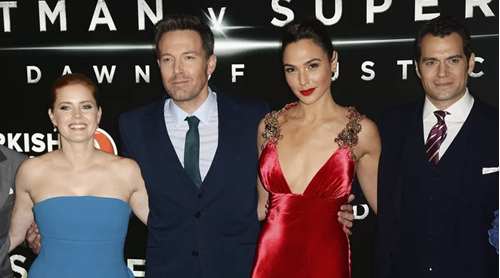
Dave J Hogan/Getty Images
What has been the most challenging, big-budget underwater work you've done?
Well, just as far as the coordination, I did a picture called "I, Robot," which was the story of how Will Smith's character came to be. He was rescued by a robot when his car went off the road after he'd collided with another car. There was a woman and a little girl in the car. And the woman, I think, was dead but the little girl was still trapped in the car. And we had linked two cars together on a gimbal that just sank. So one car was on an angle and the other one was on a gimbal and they both sank at the same time. In the car we had Will Smith's stunt double, who said he was quite comfortable underwater, but once we flooded the car, it became glaringly apparent that that was not the case, so he bailed.
But basically I was in Will Smith's car photographing through the window the girl who's trapped in the other car and she's a synchronized swimmer able to hold her breath for a long period of time, but the whole thing had to be timed. The move was a 360 pan. If you see the movie, the robot jumps on the rear of the trunk. You pan over and then follow the robot all the way over to the window. You pan over to the girl in the water and pan back to the robot.
Everything had to be completely ironed out on the surface. And the young synchronized swimmer girl who did the breath hold work was amazing because there were a lot of times she was still holding her breath even when she's not on camera. And she couldn't see anything either. I mean, the coordination of that — there was a safety diver in the car who had to be on the ground because you would see him otherwise. You'd see all the hoses, you'd see everything. So really, she was on her own in a car underwater, not able to get out. And at times, she wasn't even on camera.
Meanwhile, any of the stuff we did on "Batman v Superman" where Amy Adams is trapped — I'm not sure what building Superman and Batman go into and have that fight. But she ends up falling and Superman goes to rescue her but gets overwhelmed by kryptonite or something. Anyway, that set had not been prepped properly by the construction department. The set started to rust, so I had to go in and vacuum it because otherwise you're photographing the rust particles. I got a double ear infection as a result of that. And Amy Adams got an ear infection as well. Although we powered through, and one morning I saw her coming out of her trailer and she said, "How are you doing?" And I said, "I'm touch and go." I had to be out of the water for two weeks or something like that. But she had to act. She had to work the next day. I actually think she tried and they had to stop shooting.
That's why on "Jungle Cruise," I was quite adamant when I got to Atlanta. I said, "We can't have materials in there that are going to dissolve or that are going to break apart." You have to use marine-grade materials and all this stuff. And the art department appreciated all of that so we didn't have any problems at all. Because if you've got Emily and Dwayne with their eyes open and any of that goop that's floating around, it's going to go right in there and in their ears and up their nose and everything else. It just means that you've got to be vigilant about all that kind of stuff.
So, I mean, as far as the challenge is concerned, every job has got challenges. But I guess "I, Robot" was technically difficult. There was nothing difficult about the camera work at all that I was doing, but just as far as the whole safety element, that was probably the diciest thing.
What's next for you? Where will we see your work next?
There is a film coming out, I believe it's going to be at the Telluride and Toronto film festivals. It's a film about the Thai cave rescue, which is a follow-up from the directors who did "Free Solo," Elizabeth Chai Vasarhelyi and Jimmy Chin. That might get a general release in December, maybe.
Then there's another picture for Netflix called "Slumberland," which was directed by Francis Lawrence and stars Jason Momoa. It's a fantasy film that should be out in March next year. And there's also a film that was shot for DreamWorks but was purchased by Apple that's called "Finch" and I think it'll only be on Apple TV+ as far as I'm aware. And that's got Tom Hanks in it and was directed by Miguel Sapochnik, who did "Game of Thrones." I shot second unit on that film. So, yeah, those are the three projects that are coming out — and there's a couple that are still in the works, stuff that I'm not supposed to talk about yet...
Seabrook's latest film, "Jungle Cruise," is currently in theaters and streaming on Disney+ with Premier Access.